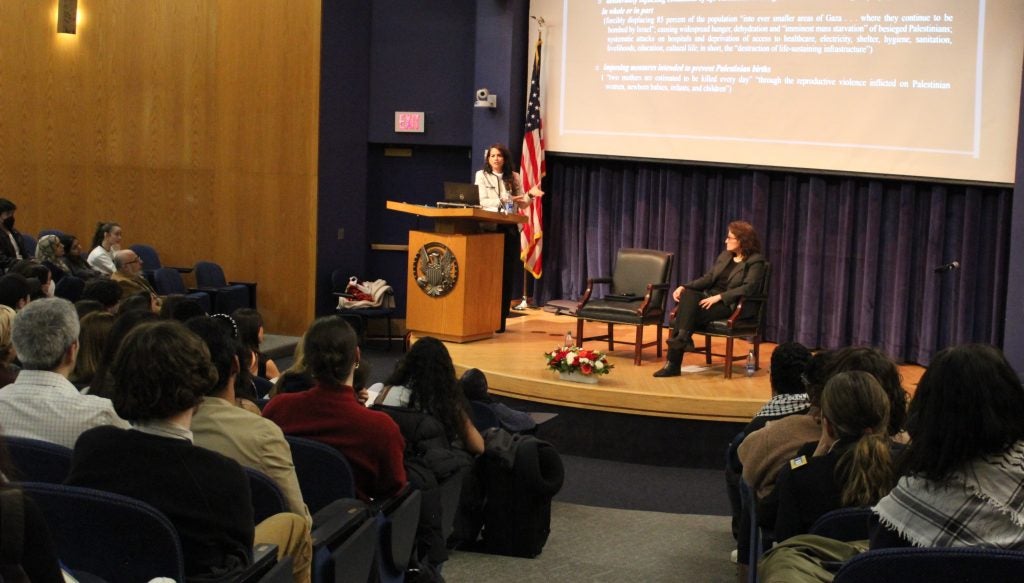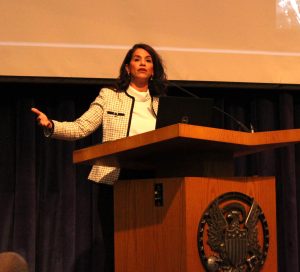
Reflections on the 2024 Kareema Al-Khoury Lecture, featuring Professor Noura Erakat, human rights attorney and leading voice on Palestinian rights.
By Leena Khan
On February 15, 2024, CCAS welcomed renowned legal scholar Professor Noura Erakat to deliver the 2024 Kareema Al-Khoury lecture, “The Limits and Potential of International Law in Achieving Accountability in Gaza.” The Kareema Al-Khoury Distinguished Lecture Series is an annual speaker event established in 1976 to bring eminent scholars of the Arab world to Georgetown. Professor Erakat is a human rights attorney, author, and activist who has emerged as a leading voice worldwide on Palestinian rights. Erakat, an Associate Professor at Rutgers University, joins the esteemed list of Kareema Al-Khoury guest lecturers that have included Edward Said, Laila Abu Lughod, Albert Hourani, and Kamal Boullata.
For the past five months, all eyes have been on Gaza witnessing a horrific genocide unfold live on television and social media. The International Court of Justice has issued a nearly unanimous ruling ordering Israel to prevent genocidal activities in Gaza. Meanwhile, Congress was (at the time of writing this article) deliberating a defense-spending bill promising $14.1 billion of security assistance to Israel, which would supplement the annual $3.3 billion of unconditional military aid that the United States already provides. The world’s highest international court, our federal government, and citizens around the globe are all watching Gaza with rapt attention. Professor Erakat provided invaluable insight into how these visions map out by international law and what they mean for the future of Gaza.
Professor Erakat has exceptional expertise on international law and its applications to Palestine. Born in California to Palestinian immigrants, Erakat received her J.D. from U.C. Berkeley and L.L.M in National Security at Georgetown University. Since then, she has published groundbreaking work on human rights law and social justice, including the award-winning book Justice for Some: Law and The Question of Palestine. She is a co-founding editor of Jadaliyya, an electronic magazine producing critical analysis on the Middle East through scholarly expertise and local knowledge. She has served as Legal Advocate for the Badil Resource Center for Palestinian Refugee and Residency Rights, and as national organizer of the US Campaign to End the Israeli Occupation. Professor Erakat has commented on major news networks about the Palestinian question, including CNN, BBC, and MSNBC. We were honored to hear her thoughts on international law and Gaza here at Georgetown.
Professor Erakat opened her discussion with a brief overview of a January 26, 2024 preliminary ruling by the International Court of Justice on South Africa’s case alleging that Israel is committing genocide against the Palestinian people in Gaza in direct violation of the Genocide Convention of 1948. The Court ordered provisional measures requiring that Israel prevent acts of genocide in Gaza. The response to this order has been mixed — South Africa and the Palestinian Authority declared it a victory, yet Israel and the United States celebrated the absence of an explicit call for a ceasefire as an alignment with their current policy. Professor Erakat clarified exactly what this decision means: that the ICJ demanded a ceasefire in everything but name.
Erakat explained that the decision was groundbreaking because it recognized there was standing to bring the case to begin with. In the context of international law, “wars are legitimate, but genocide is never okay,” she said. The ICJ observed that Israel’s actions in Gaza do not amount to a self-defensive war, but to total destruction, citing genocidal statements made by Israeli political leaders and the devastating level of civilian death in Gaza, amongst other things. In light of this evidence, the ICJ commanded that Israel prevent the mass killing of civilians. “This a strong decision,” Erakat asserted, “and we can use it as a tool to demand an immediate ceasefire.”

Erakat refuted the two defenses that Israel put forth against the genocide accusation. Genocide has a narrow legal definition; it amounts to targeting members of a non-political identity group with the intent to destroy. Israel contended it is killing Palestinians for their political status as Hamas, not because of who they are as Palestinians. But the evidence raises a different presumption. Israel has targeted all 35 hospitals in Gaza, it has assassinated dozens of journalists, it has killed an average of 117 Palestinians per day. Palestinians are guilty for the simple crime of existence, for their refusal to disappear. “Their national existence challenges Israel’s settler sovereignty,” Erakat explained, and so Israel kills Palestinians “because of who they are, regardless of what they do.”
Israel’s second defense was that it’s engaging in legitimate self defense against the Hamas attack on October 7th, and therefore all means employed in its campaign are legitimate. However, according to the Fourth Geneva Convention, a state has no right to military force against a territory that it occupies. Erakat explained that Israel has controlled Gaza’s land, sea, and air borders for the past 17 years, which effectively makes it an occupying power. Put simply, an occupier cannot defend itself against the occupied; it is in a naturally offensive position against them. Israel has attempted to blur its legal status as an occupier by naming Gaza a “hostile entity” rather than a sovereign people, yet international legal bodies like the ICC have decisively recognized Gaza as an occupied territory.
But despite the strength of the case against Israel, Erakat predicted that the ICJ trial will end without a guilty conviction. The law relies on precedent, and precedent is simply unfavorable. For instance, after the Bosnian genocide, the ICJ ruled that only one massacre constituted genocide, and even then, that the Serbian government was not responsible for it. Moreover, the original genocide against the Palestinian people, the 1948 Nakba, has long been accepted in international law. When Israel declared its statehood in 1948, it denied that Arab Palestinians also had a right to statehood and ethnically cleansed them from the land. United Nations Resolution 242, passed nineteen years later, normalized Israel’s bloody seizure of the land. It refers to the Palestinians displaced by Israel merely as the “refugee problem,” eliding their long-overdue right to self-determination and their legitimacy as a people.
Erakat’s overarching lesson was that there are serious limits to international law in achieving accountability in Gaza. Even in the unlikely scenario that the ICJ issues a guilty verdict, the Court doesn’t have the authority to enforce it. However, there is hope on the horizon. The ICJ may not be able to enforce its rulings, but, according to Erakat, we certainly can. Erakat explained that the power of international law rests in the people who choose to use it. She presented international law as a tool to shape imagination, legitimizing the efforts of individuals, organizations, and governments taking action against the genocide in Gaza. Erakat shared some examples, noting that following the preliminary ruling ordering Israel to prevent genocide, Dutch rights groups sued their government and stopped weapons shipments to Israel. Another example was a Japanese company that recently ties with Israeli defense businesses.
International law is an important tool to promote accountability for powerful world actors that otherwise commit atrocities with absolute impunity. But it is by no means our ultimate moral authority. Neither are our governments, nor our corporations, nor any of the institutional forces that have enabled this genocide. The ongoing atrocities in Gaza are an absolute failure of our current systems of justice, and the people have noticed. We are awake, and we are committed to enact change. “I believe in your rebellious generation,” Erakat said, and was met with a standing ovation.
You can watch Professor Erakat’s talk on the CCAS YouTube Channel.
Leena Khan is a 2023 SFS graduate that majored in International Politics and earned an Undergraduate Arab Studies Certificate from CCAS.